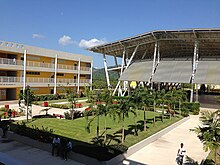State University of Haiti
Université d'Etat d'Haïti | |
 | |
| Type | Public university |
|---|---|
| Established | 1820s |
| Rector | Jean-Vernet Henry |
| Location | |
| Affiliations | RESCIF |
| Website | www.ueh.edu.ht |
The University of Haiti (UEH) (French: Université d'Etat d'Haïti) is one of Haiti's most prestigious institutions of higher education. It is located in Port-au-Prince.
Its origins date to the 1820s, when colleges of medicine and law were established. In 1942 the various faculties merged into the University of Haiti. After a student strike in 1960, François Duvalier's government brought the university under firm government control and renamed it the State University of Haiti. In 1983, the University became an independent institution according to the Haitian constitution. The University's independent status was confirmed in the Haitian constitution of 1987.
In 1981 there were 4,099 students at the University of Haiti, of whom 26% were enrolled in the Faculty of Law and Economics; 25%, in the Faculty of Medicine and Pharmacy; 17%, in the Faculty of Administration and Management; and 11%, in the Faculty of Science and Topography. Despite the important role played by agriculture in the Haitian economy, only 5% of the university's students were enrolled in the Faculty of Agronomy and Veterinary Medicine. In 1981 the University of Haiti had 559 professors, compared with 207 in 1967. Most professors worked part-time, were paid on an hourly basis, and had little time for contact with students. The University of Haiti also suffered severe shortages of books and other materials.
As of 2010, tuition was US$15 a year. However, while this made it more affordable for many Haitians than other forms of tertiary education in the country, competition for places was fierce. The university accepted only 15 per cent of applicants for undergraduate places, while its dentistry school had just 20 places for about 800 applicants yearly.[1]

Among its past rectors, the University includes the writer Jean Price Mars.
The university's buildings were largely destroyed during the earthquake of January 12, 2010. A consortium of historically black colleges from the United States have formed a consortium to help rebuild part of the campus.[2]
After the earthquake, the government of the Dominican Republic paid for the construction of a new university campus near the town of Limonade in northern Haiti, called the Universite Roi Henri Christophe.[3]
Constituent Colleges and Schools
- École Normale Supérieure
- Faculty of Agronomy and Veterinary Medicine
- Faculty of Humanities
- Faculty of Science
- Faculty of Law and Economic Sciences
- Faculty of Ethnology
- Faculty of Applied Linguistics
- Faculty of Medicine and Pharmacy
- Faculty of Dentistry
- Institute of African Studies and Research
- National Institute of Administration, Management and International Studies
- School of Law and Economy at Port-de-Paix
- School of Law at Hinche
- School of Law at Jacmel
- School of Law and Economics at Cayes
- School of Law and Economics at Fort-Liberté
- School of Law and Economics at Gonaïves (École de Droit et des Sciences Économiques des Gonaïves)
- Faculty of Law, Economics and Management at Cap-Haitien
- Henri Christophe Center for Higher Education at Limonade (Universite Roi Henri Christophe de Limonade)[3]
References
- ^ "Haitian universities are a lesson in hard knocks". The Star. Toronto. December 30, 2010. Retrieved February 21, 2013.
- ^ "Black colleges help rebuild State University of Haiti". Retrieved February 21, 2013.
- ^ a b "Haiti Officially Opens Roi Henri Christophe Campus in Limonade". Caribbean Journal. Retrieved 23 March 2015.
